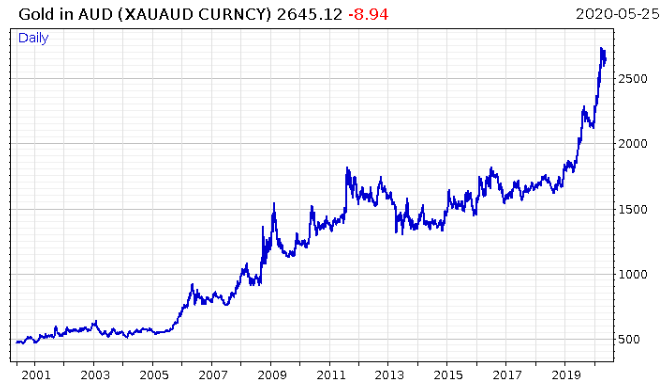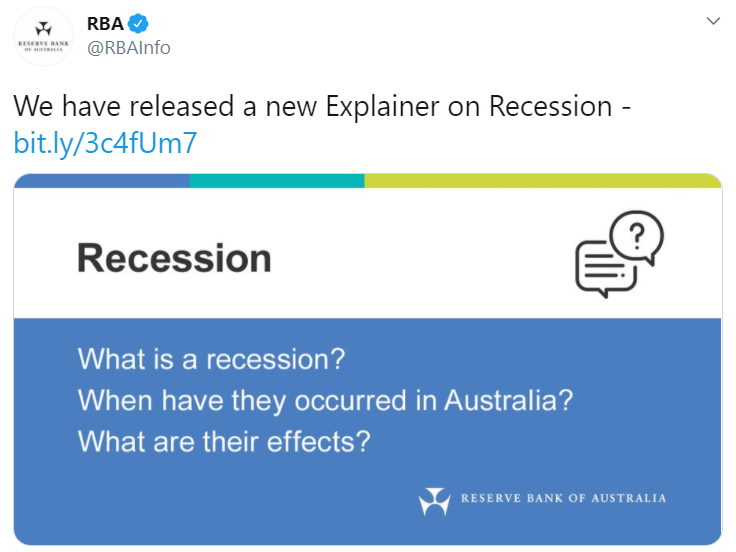Imagine if the Bank of England started taking to Twitter to make sure we knew what the word recession means – outside of a recession. You might find it strange – ominous, even – that such an institution would suddenly want to educate us on the topic.
That’s what’s just happened in Australia, where its central bank has begun publishing helpful “explainer” articles:
In yesterday’s note we commented that fear in the global dollar banking system was dissipating, removing some of the systemic risk posed by the WuFlu lockdown. But there are plenty of places in the world where the fallout of all this is going to leave a permanent mark, or reveal a problem that had been papered over for the last decade.
Australia, in my view, will be one of these places.
Down Under, Down Under
“Oz” is a land of opposites and extremes.
The country is gigantic, but barely anyone lives in it – vast swathes of the country are utterly desolate and barren. In fact, there are only five other countries which are emptier than Australia, which include the likes of the Falklands and Greenland. But the areas where people do live are rammed full of people and living space is in incredibly short supply.
Its economy is hugely reliant upon China… and yet it has one of the closest defence partnerships with the US in the world. Australia’s “open minded” approach to the whole “spying on citizens” thing has made it the hub of the US-led Five Eyes surveillance network.
The weather at the centre of the country is so harsh that some choose to live underground, like human moles. But for those on the coast, the weather is just right and they bathe in the sun almost all year round.
Bill Bryson put the colossal self-contradiction within Australia in perspective well in his book Down Under where he describes the positives of living in Australia…
Their cities are safe and clean and nearly always built on water. They have a society that is prosperous, well ordered, and instinctively egalitarian. The food is excellent. The beer is cold. The sun nearly always shines. There is coffee on every corner. Life doesn’t get much better than this.
Along with the rather brutal negatives…
Of the world’s ten most poisonous snakes, all are Australian. Five of its creatures – the funnel web spider, box jellyfish, blue-ringed octopus, paralysis tick, and stonefish – are the most lethal of their type in the world. This is a country where even the fluffiest of caterpillars can lay you out with a toxic nip, where seashells will not just sting you but actually sometimes go for you. … If you are not stung or pronged to death in some unexpected manner, you may be fatally chomped by sharks or crocodiles, or carried helplessly out to sea by irresistible currents, or left to stagger to an unhappy death in the baking outback.
In this land of Vegemite, of paradox and paradise… they haven’t had a recession in almost 30 years. Take a moment to imagine what that must be like – one continuing economic expansion, a continuous increase in prosperity and development lasting over a generation, uninterrupted…
To Australians old enough to remember, recessions are just like Beanie Babies or flared jeans – something left behind in a decade past. To the millennial Australian, recessions are just something their parents did, or as the tweet from the Reserve Bank of Australia suggests, something they haven’t actually heard of.
Australia dodged the 2008 bullet because lying within its soil lies more gold, iron, lead, zinc and uranium than any other country on the planet. The commodity boom which ignited in the 2000s and continued after the crisis buoyed the Aussie economy, and then China began pouring concrete and building roads to anywhere and cities for the sake of it immediately after.
The demand for commodities from Oz continued, but importantly much of the new wealth created spilled through from China into the Aussie economy, most visibly through the likes of real estate investment. For the nouveau riche Chinese businessman, Australia, like Canada, is a close port of call to get cash out of China and build a second life elsewhere. Australia became one of the key conduits through which Chinese economic growth was exported to the rest of the world, and made it to 2020 without a cent of QE…
But now with its biggest commodity customer now clearly an adversary of the US, and with the WuFlu lockdown calling the sustainability of Australia’s huge household indebtedness into question (when I said living space cost a fortune in Oz, I really meant it), darkness is finally descending upon paradise.
Having abstained from indulging in QE so far, the RBA finally gave in back in March with a promise to print as much money as was required – “whatever is necessary”, etc – to prevent the cost of three-year government debt falling to a price deemed too low. And now, with the attempt of the RBA to educate “da yoof” on what a recession is, it seems inevitable that Australia’s near 30-year streak of avoiding a recession is coming to an end.
Ironically, that doesn’t mean there aren’t opportunities to invest in Australia right now. As we mentioned, there’s a lotta gold in them hills, and Australia, compared to other nations blessed with gold deposits, is remarkably peaceful and respectful of private property rights.
When the real economy is doing well, it’s generally not a great time to be heavily invested in gold. And yet, just as with many of the other Australian paradoxes, the Aussie gold investor has been living in paradise for the past 20 years even with no recession and no QE. The bear market for gold after 2011 wasn’t all that painful for gold investors buying and counting their bullion in Aussie dollars:

Nothing bad has stuck to Australia since the early 90s – until now. It’s a changing of the trend to pay attention to. With Down Under now going under, we’ve entered a new era, which will have its own trends we’re not yet familiar with.
Until tomorrow,
Boaz Shoshan
Editor, Capital & Conflict
For charts and other financial/geopolitical content, follow me on Twitter: @FederalExcess.
Category: Market updates



